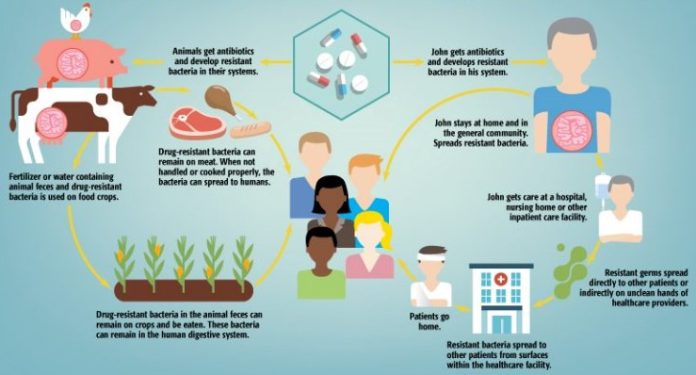Antibiotics are medicines used to prevent and treat bacterial infections, but the misuse or overuse of antibiotics can accelerate antibiotic resistance and lead to avoidable deaths or morbidity.
Antibiotic resistance is when bacteria change in response to the use of these medicines, as well as poor infection prevention and control.
It is projected that by 2050, treating antimicrobial resistance could cost $300 billion to over $1 trillion annually globally.
In Nigeria, seven out of 10 persons in the community access antibiotics outside licensed health facilities or pharmacies, while many patients in the hospitals are over-prescribed antibiotics that have a higher risk of bacterial resistance.
According to the World Health Organisation, antibiotic resistance is rising to dangerously high levels in all parts of the world.

“New resistance mechanisms are emerging and spreading globally, threatening our ability to treat common infectious diseases. A growing list of infections – such as pneumonia, tuberculosis, blood poisoning, gonorrhoea, and foodborne diseases – are becoming harder, and sometimes impossible, to treat as antibiotics become less effective,” WHO said.
Curbing antibiotic resistance
However, steps can be taken to reduce the impact of antibiotic resistance.
Use antibiotics only when prescribed: Experts advise individuals to only use antibiotics when prescribed by a certified health professional.
The Chair of the Nigeria Antimicrobial Resistance Coordination Committee, Dr. Tochi Okwor said buying antibiotics without prescription can lead to antimicrobial resistance.
pneumonia, tuberculosis, blood poisoning, gonorrhoea, and foodborne diseases – are becoming harder, and sometimes impossible, to treat as antibiotics become less effective
She said, “You are not sure if the antibiotics you are buying is the right one to buy for the ailment you are having and you will need an expert to examine you to know what is wrong with you before prescribing the mediciation to take.
“The best way to take antibiotics is to visit the hospital so that the right medications can be prescribed accordingly.”
Complete the antibiotic course: You have to complete the antibiotic course based on the instructions given by the physician. Dr Okwor said the experts who prescribes medication know the duration of the course based on the best evidence. Hence, individuals must adhere strictly to the antibiotic course based on the instructions given.
WHO said, “If you are being treated for an infection, the kind of antibiotics your doctor prescribes and the length of the course should be based on the best evidence.
“Feeling better, or an improvement in symptoms, does not always mean that the infection has completely gone. Your doctor has had years of training and has access to the latest evidence – so always follow their advice.”
Don’t share your drugs with others: Always make sure that you are not sharing your antibiotic with your family members, friends, colleagues, even if the symptoms they are experiencing are similiar to yours.
The Assistant Director-General, Antimicrobial resistance at the WHO, Dr Hanan Balkhy said, “Now, on giving antibiotics and sharing it with other people, you’re actually putting them at a risk of giving them perhaps the wrong medication and also giving them the inaccurate guidance on how to use these antibiotics.”
Maintain good hygiene: Practicing good personal hygiene is important in minimising the need to use antibiotics. Endeavour to wash your hands regularly, prepare food hygienically, and avoid close contact with sick people.
Also, endeavour to keep your environment clean and stay as healthy as possible.
Keep your vaccinations up to date: Vaccines reduce risks of getting infections that will require antibiotics. When you get a vaccine, your immune system responds by building natural defences against infections.


